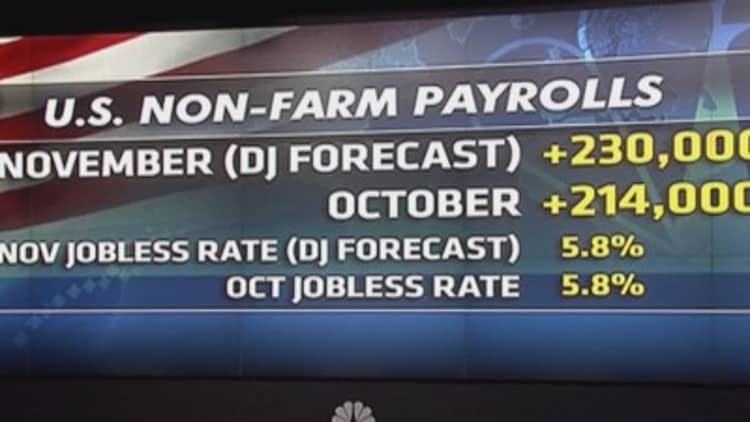American workers are on the move again, switching jobs in greater numbers in a trend that heralds faster economic growth and a more dynamic labor market.
In September, nearly 2.8 million Americans quit jobs, the most since April 2008, though still below pre-recession highs, according to the Labor Department's latest seasonally adjusted figures.
Read MoreWage growth stuckbelow pre-crisis levels
The rise in job quitters reflects a strengthening economy that comes ahead of the Labor Department's November employment report due Friday. Economists predict 225,000 jobs were added last month, the 10th straight month of job gains exceeding 200,000.
Quitters are growing in many types of businesses but most visibly in leisure and hospitality, which has added nearly 2 million jobs since early 2010. In health care, technology and engineering, skilled workers are in such high demand that many are staying in slots for just months before jumping to better-paying positions, says Paul D'Arcy, marketing chief for job site Indeed.com. And a truck driver shortage is sparking bidding wars for talent and high turnover at carriers.
"We're hearing from candidates who have a pent-up desire to make a move," says Tricia Sitelis, vice president of staffing giant Manpower.
More from USA Today:
Protests sweeps US: 'The system is rigged'
Calif floods during worst drought in 1,200 years
Starbucks goes upscale with coffee emporium
Younger workers, including many recent college graduates, are the most aggressive job switchers. Many took jobs that paid little or didn't fully utilize their skills early in the recovery. Now they are finding better matches, making for a more productive economy, says Mark Zandi, chief economist of Moody's Analytics. The number of 16- to -24-year-olds leaving one job for another in the third quarter was up 14% vs. the year-ago period, compared with a 9.5% increase for those ages 25 to 54, shows data from payroll processor ADP.
At 32, Jay Kapur is a bit older but he too followed a twisting path to a more fulfilling career. In 2011, he took a low-paying graphics designer position at a New York City college in part to gain experience in a recovering labor market. Last year, he quit to move to Northern California without a new job lined up but knowing the market for graphics designers in Silicon Valley was sizzling. Within a month, Kapur had three offers and accepted one at an e-commerce company at more than double his previous salary.
Read MoreWe've got the jobs, but show us the money
He quit after just six months to take another position at a more innovative firm in Sunnyvale, Calif., that produces cinematic-style presentations. He felt financially secure enough to take a slight pay cut after his fiancée, Nicole Cohn, landed a job as a social worker. Both started their new positions Dec. 1.
"It feels even better to not just settle for a great paycheck but to move to an environment that's very creatively fulfilling," he says.
The number of quitters like Kapur lagged a steady acceleration in job growth during most of the 5½-year-old recovery. An uncertain economy made Americans hesitant to leave stable positions to become new employees at other firms and thus more vulnerable to potential layoffs.
As a result, more businesses turned to the unemployed to fill certain openings. Now that the economy and job market are picking up, "there's more people poking their heads out and looking … rather than taking that hunkered down" position, says Paul McDonald, senior executive director of staffing firm Robert Half.
Employers are recruiting more aggressively, too, as falling unemployment shrinks the pool of jobless Americans sending out résumés. The pickup in quitters is becoming contagious: As workers see longtime colleagues depart, they're testing the waters themselves. Some of them also will leave, creating more openings to be filled.
Dan Scrivner was content as a regional financial director for a direct-sales food company, but when five co-workers with the same title left for higher-paying positions within eight months, he bolted, too.

"I said, 'I can do this,' " says the 34-year-old, who since August has been a controller for a smaller cosmetics firm called Younique Products at a significantly higher salary. The position also lets the Lehi, Utah, resident fulfill his dream of creating accounting systems at a start-up.
As companies lose more workers, they're starting to increase pay to keep staffers and attract prospects. Annual raises for private-sector workers who held the same job averaged 4.5% in the third quarter compared with 3.5% in the year-earlier period, according to ADP. Job switchers notched even bigger raises of 5.6%.
Employers are offering other perks to hold on to workers. BE Aerospace, which makes furnishings for commercial aircraft cabins, recently launched a six-month leadership development course and is starting another program to help engineers map careers.
Read MoreHere's what happens when the jobs report surprises
In a highly competitive market for aerospace engineers, "we have to engage them quickly," says Jennifer Anglehart, global manager of talent acquisition for the Welling, Fla.-based company, which employs 12,000.
Some businesses are benefiting from a more transient workforce. Spotlite, which sells employee benefits technology, is having an easier time attracting workers to the Chicago-based firm than earlier this year.
Vikki Caruso director of talent management, says she hired five employees in October, boosting its staff to 30. Software developers, salespeople and account managers she approaches at other companies are more willing to take a chance with a start-up and accept company stock as compensation because they're more confident the recovery is finally blossoming.
Tom Gimbel, CEO of LaSalle Network, which does recruiting for Chicago-based companies, says about half of the potential candidates his firm approaches accept interviews, up from about 25% a few years ago.
"Before, you'd call people and they'd say,'I'm not interested,' " Gimbel says. "Now, they say,'Tell me what it's about.' "

